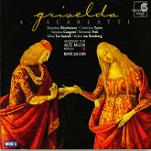Griselda was first performed in Rome in 1721, the last of Alessandro Scarlatti’s 70-or-so operas. Whether it was due to changing tastes or financial considerations, the opera was given only once and never was picked up by any other theatre. The cast consisted of five castrati and a tenor–here, the two soprano castrato roles are taken by female sopranos, two alto castrato roles are sung by mezzo-sopranos, and one castrato role, Gualtiero, is performed by a countertenor. It’s a fine solution.
The appalling plot concerns Gualtiero, King of Sicily, who, years before the start of the action, had married Griselda, a shepherdess. The people and courtiers resented having such a low-born on the throne, and Gualtiero therefore gave their first child, Constanza, to his friend Prince Corrado, telling his people that he had killed her. As the curtain goes up, the people are again demanding that Griselda be removed. Gualtiero agrees, and the opera features a series of tests and insults he puts her through, all of which she takes nobly, claiming she only wants his happiness. Ottone, a slimy courtier who is in love with Griselda and now sees his chance to snare her, announces the arrival of a young woman the King wishes to marry. She is, in fact, Constanza, now 15 years old, and she is traveling with Corrado and Roberto, Corrado’s younger brother, and they are in love. She doesn’t know who her parents are. This too is a ruse to test Griselda–Gualtiero knows who Constanza is and is just making things more difficult.
To make a hideous story short, after the King makes Griselda–now living in the woods–think that her son, too, must be killed (which she rails against but doesn’t attempt to halt), and after forbidding her to weep, he gives her to Ottone. That’s where she draws the line, saying she prefers to die rather than marry another. The people are finally impressed with Griselda’s noble heart (and Ottone admits that it was he who stirred them up), after which the king apologizes to Griselda (big deal) and all ends happily–but I don’t even want to think about the psychotherapy bills. Throughout, what stops us from simply wanting to smack Griselda for being such a doormat is her scorn–outward and intense–for Ottone. Similarly, the only reason we don’t assassinate Gualtiero is because of his heartfelt asides, exhibiting true conscience in the face of his cruelty and stupidity.
For this performing edition, René Jacobs has wisely cut some of the score: of the original 41 numbers, we are left with three hours of music made up of 29 arias, two duets, a trio, a quartet, a couple of brief sinfonias, and plenty of recitative. The arias are varied, brief-ish, and sophisticated, and while they are not coloratura showpieces, they are difficult in timing and depth of expression and feeling.
Jacobs’ cast is ideal. Dorothea Röschmann’s Griselda is always noble, purposefully belying this character’s humble origins. In her I’ll-do-what-you-want-if-it-kills-me arias she manages to avoid self-pity while still sounding plangent. Even in the aria (gorgeously accompanied by oboes and flutes) that opens the second act, in which she’s returned to her subservient rusticity (“Shady forest, you see me once more/But no longer as queen and consort:/You see me as a wretched,/Despised shepherdess”), the slight catch in her voice never gives way to maudlin expression. And a bit later she rails ferociously against Ottone without ever distorting the vocal line. Her voice is beautiful.
Lawrence Zazzo walks a tightrope as Gualtiero: On one hand he must seem shallow, conniving, cynical, cruel, and insensitive; but in his asides–of which there are many–he must convince us of his inherent goodness, and he does. His countertenor is an unusually firm instrument and he uses it remarkably. The second-act aria in which he does everything but smack Griselda in the face (“I take pleasure in your sorrow…For once to love you was my shame”) is a knockout of virtuosic vitriol. Ottone is a cowering cad and bully (“She who despises me as a queen/Will love me as a shepherdess”), and newcomer mezzo Silvia Tro Santafé has the unique, spicy timbre and spitfire delivery to etch the character properly.
Mezzo Bernarda Fink (where would Baroque opera be without her?) excels in the more one-dimensional trouser role of Roberto. His music is difficult whether he’s in love or indignant, and as usual Fink is brilliant. Veronica Cangemi avoids being too pure or adorable as Constanza, and her singing is first-rate. Last, tenor Kobie van Rensburg, in the morally ambiguous role of Corrado, has bite in his delivery and is superb in his divisions.
Jacobs has rehearsed his cast so well that the recitatives come to life as sharply as the arias, and his Akademie für Alte Musik plays with precision, energy, and a sense of purpose that could convince us that Griselda is a stageworthy undertaking. The horns are magnificent, the winds can pierce or loll, the strings attack decisively but never harshly. The continuo includes a bassoon–it takes a while to identify and appreciate it, but it’s a stroke of genius. The vocal lines are embellished with grace and sense. Griselda may not be a great Baroque opera–it’s no Giulio Cesare or Alcina–but this is as great a performance of it as we’re bound to hear. [10/9/2003]
































